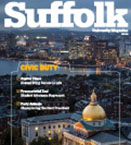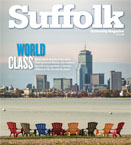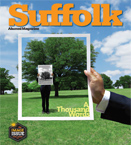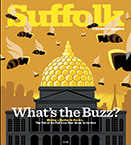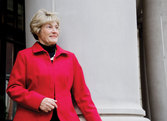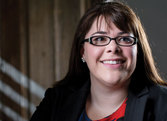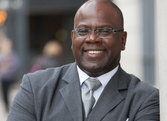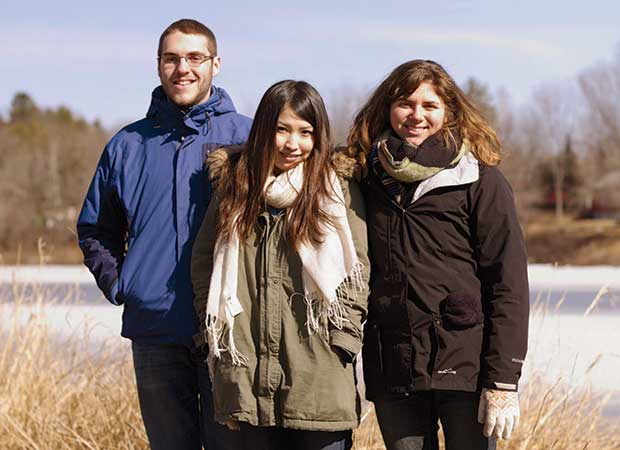
Change Agents
Driven by idealism and a passion for public service, students like Aaron Michael Lumnah '14, Mizuho Komatani '16, and Caroline McHeffey '13 are giving spring break a whole new meaning.
By Jaed Coffin
It's a rainy morning in rural Maine, midway through a week in March when many college kids across the nation are downing margaritas in Cancun.
Twelve Suffolk students are sharing breakfast at a remote house in Passdumkeag (population 374), preparing for a third day with elementary and junior high students at the Penobscot Indian Island Reservation’s community center, 20 miles south on Indian Island. When the Suffolk students aren’t playing sports and making crafts with the children, they’re learning: traditional songs and dances from the kids, the tribal history of the island, and the complex environmental and political issues that face the modern Penobscot people. This is one of a dozen such trips across the country for a week of volunteer service projects known as Alternative Spring Break. ASB is observed at many campuses, but Suffolk’s Organization for Uplifting Lives through Service (S.O.U.L.S.) has organized a particularly robust program. What began with a single trip to rehab buildings in Exmore, Virginia with 12 students in 1998 has grown to a dozen trips from Denver to Puerto Rico and 142 students this year. (See tweets, photos, and videos from the students who went on this year's trips.)
About 10:00 a.m., the students pile into minivans, drive south down a quiet road along the banks of the half-frozen river, and cross the bridge over the Penobscot for another day of “vacation.”
Aaron Michael Lumnah ’14
On paper, Aaron Michael Lumnah might not fit the model of a typical college student devoted to service. A double major in entrepreneurship and marketing from Plainville, Massachusetts, he is the president of the Suffolk Entrepreneurship Club and an intern for two related tech start-ups in Boston, Smarterer and Intelligent.ly. Lean, bespectacled, and engaging, Lumnah has the precise charisma of an innovator and the tech-savvy lucidity of his millennial generation. But his commitment to serving others is no aberration of character. “I didn’t just stumble into these ASB trips,” he says.
In March 2012, Lumnah traveled to North Carolina to work on a Habitat for Humanity project. In January 2013, he went to El Salvador to work on another Habitat project, laying the foundation of a house for a young couple and their four-year-old daughter. He is co-leader of the Indian Island trip.
“It didn’t take long for me to realize that Suffolk is loaded with opportunities to learn about social justice”—a concept that, he says, addresses “the other side of my mind.” His goal in taking these trips is to “bridge worlds” between the high-velocity ecosystem of the Boston start-up community and the vast world beyond it. “Coming up here,” Lumnah says, “reminds me that there is so much more going on.” Working with kids, taking time away from the white noise of online existence, and engaging with another culture forces him to consider his place in the world from a different angle. “Business,” Lumnah says, “should be used to benefit society. There’s got to be a way to build something for profit with a social aspect, with some type of purpose. Something I can get behind.”
The son of a mother who works in insurance and a father who is in the jewelry manufacturing industry, Lumnah, the oldest of three siblings, was raised in the same neighborhood where both his parents grew up. When he graduated from high school, he had little idea of what he wanted to do with his life. But while taking a tour of the Suffolk campus, gazing at the Boston skyline from the 19th floor of a dorm building, Lumnah thought, “I have to go here.”
Soon he was deeply involved in the Suffolk community: he joined the entrepreneurship club, enrolled in his first service trip with S.O.U.L.S., and reached out to Sarah Hodges, co-founder of Intelligent.ly and marketing head of Smarterer. Hodges hired Lumnah over the phone. “He’s a stellar marketer,” she says. “He’s incredibly creative, the kind of person who can really take something to the next level, who can grow something out of nothing.” It didn’t take long for Hodges to recognize that in Lumnah she had a serious, passionate worker: at the launch party for Intelligent.ly, many of the interns and employees showed up in sneakers, hoodies, and jeans, the casual attire of the young, capable, and hip. Lumnah? “He was the only guy wearing a suit, and he was carrying a leather folio under his arm,” Hodges recalls. “He’s just that kind of person who interprets everything as a passion, no matter what he’s doing.”
This morning on Indian Island, Lumnah and his fellow Suffolk students meet with Penobscot tribal historian James Eric Francis. In his talk, Francis explains the relationship between storytelling, geography, and place in the Penobscot’s cultural consciousness. Afterward, Lumnah stands with community leader John Neptune in the middle of the basketball court, next to a bucket and a mop. They speak briefly, gesture with their hands, nod in agreement. Then Lumnah sets off across the gym floor, pushing the mop ahead of him, encouraging his fellow Suffolk students to join in. About three o’clock, a line of kids file into the community center. A few boys throw down their backpacks and rush over to Lumnah. In the last few days, he’s developed a reputation for giving piggyback rides and playing with Legos.
“They give me such a different perspective,” Lumnah says of his time working with the children. “They remind me that not everything in Boston is as important as I think it is.”
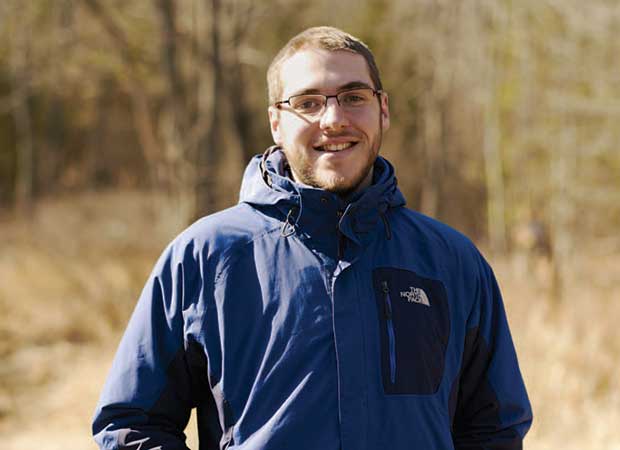
Mizuho Komatani ’16
During a civics class in her sophomore year of high school in Osaka, Japan, Mizuho Komatani was shown a photograph depicting an emaciated toddler in Sudan, a vulture waiting in the background. Her teacher posed a question: What should one do? Help the child, or take the picture and tell the story? Since that day, Komatani has been trying to make sense of that question.
Part of the answer begins with her first ASB trip, to Indian Island. “I always want to know what is going on in the world, and how can I tell these stories?” she says. In Osaka, Komatani lives with her parents and two younger siblings. Her father teaches at a high school, and her mother stays at home. Komatani chose to study English because she wanted “to connect with more people around the world.” Prior to coming to Boston, she spent a year in Missouri, living as an exchange student in a household with a Brazilian host mother and an American father, and found herself “fascinated by the many layers of culture in America.” On a two-semester exchange from Kyoto’s Ritsumeikan University, Komatani has embraced her life at Suffolk with academic fervor. Her former adviser and professor, Assistant Director of Undergraduate Advising Peter Palumbo, witnessed this firsthand in his course Interpersonal Communication. “Mizuho was the kind of student that would never settle for ‘good enough,’” he says. In the future, Komatani sees herself working for a high-visibility ad agency in Japan. “Creating and telling a message to others, knowing how to communicate with people, this is so important,” she says. For now, though, the hardest thing about being an ASB volunteer at Indian Island is “speaking English all day,” she says. “By the time I figure out how to say something, the subject has already changed.”
This ASB trip has given Komatani time to engage with others in a different way, to work with people from different backgrounds, and to do what she loves most: share her culture and learn about the culture of others. Earlier in the week, she found herself deeply impressed by the way the children on Indian Island knew their traditional songs and dances and were comfortable performing them in front of strangers. “The passing of their art down to the next generation is just amazing,” Komatani says. Her first day working at the community center fell on the second anniversary of the tsunami in Japan—an event that Komatani witnessed on television. “I wanted to do something for people in Tohoku,” she recalls, “but I lived far from there, so I could not do anything for them except collecting contributions. This event impacted me a lot and made me think about others. That became an opportunity to participate in social services as a volunteer.”
During quiet evenings at the house in Passadumkeag, several of Komatani’s fellow ASB volunteers taught her how to weave friendship bracelets. In exchange, Komatani taught them how to fold paper cranes. One of her many goals this week is to produce 1,000 as a group. The cranes are perched upon shelves, not yet 1,000, but close.
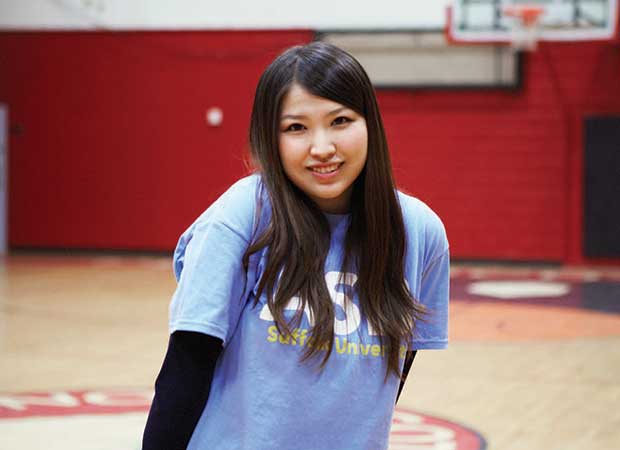
Caroline Mcheffey ’13
Before coming to Indian Island, history major Caroline McHeffey hadn’t spent much time with kids. Yet the Maine trip was her first choice among this year’s dozen ASB options. “I feel strongly about the treatment of Natives in the U.S. and I think it is somewhat atrocious,” she says. “I chose Maine because I wanted to learn more about Native American life and what hardships this particular Nation faces.”
Confident, composed, and self-possessed, McHeffey admits that “before coming here, I found kids really intimidating.” But shortly after arriving at Indian Island and watching the children perform their tribal songs and dances, she found herself, to some degree, able to relate. From a family of six from Center Moriches, New York, McHeffey was deeply influenced by her father’s commitment to social justice and community engagement through the medium of music. Her father, an amateur musician and business professor (her mother works at an insurance agency) “used to just take us to random places to perform.” At one of the nightly reflections in Passadumkeag, McHeffey shared with the group that she was once in a family band called Bees, Trees, and Me and performed at local zoos and nursing homes. Her father’s Catholic faith didn’t always align with her own beliefs, but the understanding that “God is love” stuck with her. A religious studies minor, McHeffey finds that “once you study more than one religion, it’s hard to only believe in only one.” But this inclusive worldview doesn’t alter her belief that “something guides the universe,” a conviction that she admits is “very fused” with her motivation to volunteer, to be of service, to spend a spring break working with children on Indian Island. “Ultimately, it’s all about love and compassion,” she says. “I try to make that drive what I do.”
On campus, McHeffey’s reputation for working to make the world a better place precedes her. S.O.U.L.S. Director Carolina Garcia says, “She’s so committed: to women’s issues, to issues of the elderly, the homeless, through whatever she does, be it literature, art, history, the nonprofit world.” Last fall, McHeffey was asked to interview the residents of a homeless shelter for a project in which their stories would be shared for a fundraising event. “What she wrote about each person was incredible,” Garcia recalls. At the reception and opening for the event that several residents attended, Garcia says, “They got here, and they all wanted to talk to Caroline.”
After participating in an Alternative Winter Break trip to El Salvador last January and taking a literature class on apartheid in South Africa with Suffolk University Associate Professor of English Bryan Trabold, McHeffey has come to believe that “service” can be “really tricky.” She can’t help but ask herself tough questions: “Does coming here and sweeping someone’s floor really make a difference?”
Trabold says, “Caroline is a student who thinks deeply about the world, and who also feels deeply for those who are facing hardships. As clichéd as it might sound, she’s an idealistic young person who genuinely wants to change the world.”
Yet McHeffey tempers her idealism with realism. “I used to think I was just going to save the world, like on TV,” she says. “People say this all the time, but on ASB you learn more from the people here than they learn from you. It’s so humbling. You learn that you don’t know a lot and, as college kids, we can’t learn that enough.”
A group of young girls wander into the gymnasium, dressed in skate shoes and tapping away at smartphone screens. Two days ago, McHeffey felt awkward about introducing herself to these kids. She’s not sure why, but they never asked her what she was doing here. “That’s when I decided I was going to break down some barriers, be myself, and just see what happens.” Today, she says, her legs and back are sore “from playing so much dodgeball and tag.”
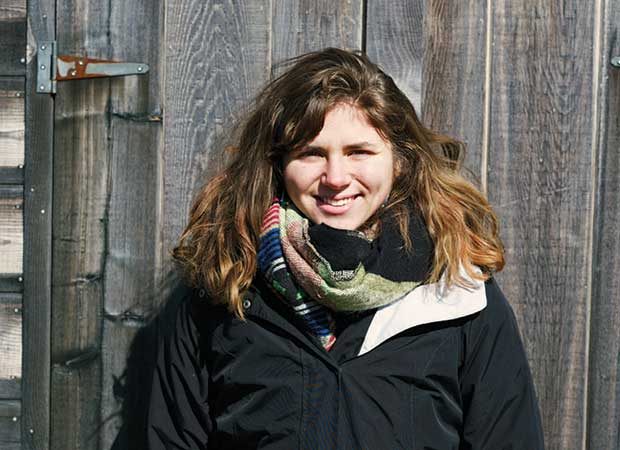
Over the course of the next three days, Lumnah, Komatani, McHeffey, and the other ASB students will gradually become more immersed in the daily life of Indian Island. On Thursday night, they’ll sit courtside with the parents of the children they’ve spent the week with and cheer on the coed Indian Island basketball team. They’ll spend a morning with a storyteller and learn about the medicinal plants that grow in the nearby forests. On Friday, they’ll eat a farewell lunch with the children and community leaders—lasagna and Indian tacos made from moose meat and venison, followed by cake made from wild blueberries. On Friday night, at the house in Passadumkeag, they’ll roast marshmallows over a bonfire and reminisce about the week. “It was so weird saying goodbye to people you’re probably never going to see again,” McHeffey says. The next morning, the Suffolk students return to their campus just as the melee of St. Patrick’s Day celebrations are getting underway. “What’s going on in this city?” Komatani asks the other ASB students. Already, the week she’d spent on Indian Island felt like “an entire life ago.”
Lumnah was recognized as S.O.U.L.S. volunteer of the month for March. “There are so many different kinds of education,” he says. “Being … with the kids has really reinforced that for me.” After Suffolk, he’s considering enrolling in City Year, a program that places recent college grads in inner-city youth programs. McHeffey, who just graduated, is more wistful about what she’ll do next: “Maybe move to North Dakota, live on a farm.” By summer, Komatani will return to Japan to complete her studies in Kyoto.
Perhaps all of them will remember the words of James Eric Francis, who, in explaining the relationship between the Penobscot people and their sprawling homeland along the river, told them: “We are the river. The river is us. We’re always home, no matter where we go.”
